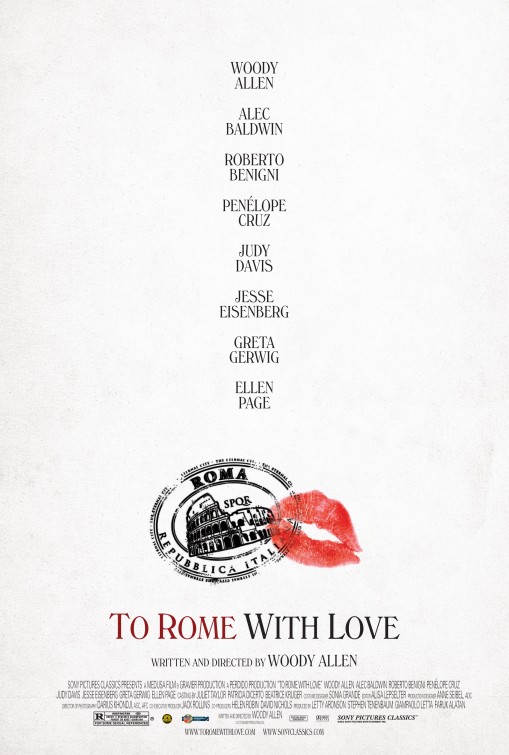Life In The Eternal City
Director
Woody Allen
Starring
Judy Davis
Roberto Benigni
Alec Baldwin
Alessandro Tiberi
Alessandra Mastronardi
Set in a very romanticised version of Rome (anyone who’s actually been there can attest to this) akin to Rome of fifties and sixties cinema, we are introduced to four distinct but unconnected stories. In the first, American tourist, Hayley [Alison Pill] meets and falls in love with Italian lawyer, Michelangelo [Flavio Parenti] and the day arrives for the respective parents to meet one another. Hayley’s father, Jerry [Allen] equates retirement with death and is fighting it every step of the way. Meeting Michelangelo’s father, Giancarlo [Fabio Armiliato], Jerry is taken aback by the power and beauty of his operatic talents. Jerry, having a history with theatrical and opera productions, convinces Giancarlo to audition. It is soon discovered that despite his amazing voice, Giancarlo can only sing to perfection while showering. Naturally, Jerry pairs the two and decides to put on a production of several arias being sung from a portable shower, much to the distress and chagrin of Michelangelo. The second tale introduces us to a newlywed couple who are hoping to make a new start in Rome, the bumbling timid Antonio [Tiberi] and the wide-eyed seemingly naïve Milly [Mastronardi]. A great deal of importance is put upon introducing Milly to Antonio’s aunts and uncles to ensure he gets a respectable job opening. Convinced she looks like a small town teacher, Milly ventures out to get her hair done, getting lost and losing her mobile phone in the process. At the same time, Antonio is visited by Anna [Penelope Cruz], a prostitute who has been paid to show the occupant of room 504 a good time. Granted, Antonio is clearly not the correct recipient of this ‘gift’ but Anna seems unfazed. Whilst trying to get Anna to leave, Antonio’s aunts and uncles arrive and simply assume that Anna is his wife, Milly. At the same time, Milly stumbles onto a film set and is star struck by one of the lead actors. The third story is one of the simplest, based on the absurd concept that regular people are sometimes famous for being famous. Leopoldo [Benigni] is an average middle-class citizen in an average job when suddenly he finds himself swamped by reporters and booked for television shows to answer banal questions about his life. Cursed by this sudden and apparently unjustified attention, Leopoldo has a hard time coping. The fourth story involves renowned architect John Foye [Baldwin] who meets an architecture student, Jack [Jesse Eisenberg] living in the same building he used to occupy decades ago. Jack lives with his girlfriend Sally [Greta Gerwig] but the relationship grows complicated when her highly sexual and mercurial best friend Monica [Ellen Page] appears. John offers wisdom, guidance and council throughout.
Ultimately these are very simple roles in a very predictable story with no real surprise – especially if you’re familiar with Woody Allen’s work – but the performances and the farcical melodrama of the scenarios is enough to hold your attention and warrant praise. See, in my opinion, the key to enjoying Woody Allen’s comedies is immersing yourself in the unabashed ludicrousness of it all; that and having some sort of interest in the key features Allen tends to focus on: death, love, infidelity, success, sex, happiness, psychoanalysis, etc. The dramas are usually easier to market and contain fewer traits and signatures but a Woody Allen comedy is an acquired taste. Subsequently, audiences and fans alike are far too harsh on the man. He punches out a film a year, sometimes two and while not every single one is a winner, most have been incredibly well crafted cinematic tales. The main complaint I’m hearing is that To Rome With Love isn’t as good as Midnight In Paris.. which it isn’t. But then it shouldn’t be. This is a different film and while it’s not of the same calibre, it’s an entertaining escape.
As stated earlier, this is a very romanticised view of Italian life full of wine, food, sex, love, passionate arguments, shouting, arms waving around, all set against this gorgeous amber backdrop, populated with some of the finest architecture the world has to offer. As such, the direction is perfectly pleasing, the editing is smooth and coordinated, the cinematography is lush and inviting and the score is atypically fitting despite its stereotypical qualities. But apart from being a decently constructed movie, it’s an amusing paint-by-numbers affair. Sure, the characters aren’t the most fleshed out, the resolutions are implausibly neat, the developments are absurd and the stories aren’t the most inspired but for a relaxed escapist medley, it works.
I’ve become very fearful of late of the number seven. Seven out of ten seems to be the critics’ safe option, neither overly praising nor damning a film. But this feels like a seven to. I was captivated while the film was on and the story and characters resonated with me for the remainder of my evening. Granted, I doubt I’ll be seeking out for regular viewings but I’d happily recommend it and while it’s not exceptional groundbreaking cinema, it’s light, thoroughly pleasant and rather fun. So there, justification of a seven out of ten. Now hop it.
Release Date:
21st September 2012
The Scene To Look Out For:
No matter how many times the joke was rehashed, seeing Italian tenor Fabio Armiliato in the shower singing various arias had me in fits of giggles. In particular, I found it difficult to compose myself while Giancarlo was smearing white paint on his face, singing Vesti la giubba from Pagliacci. As a fan of opera, it’s always nice seeing a writer/director calling on some of the most timeless and haunting pieces.. especially for comedic purposes.
Notable Characters:
[redacted]
Highlighted Quote:
“Don’t psychoanalyse me. Many have tried, all have failed”
In A Few Words:
“Not exactly Woody Allen’s finest work but a pleasing rehash postcard of familiar themes with a myriad of fine performances and lavish locations”
Total Score: 2/5
![The Red Right Hand Movie Reviews [Matthew Stogdon]](https://reviews.theredrighthand.co.uk/wp-content/uploads/2021/12/cropped-header1.png)




